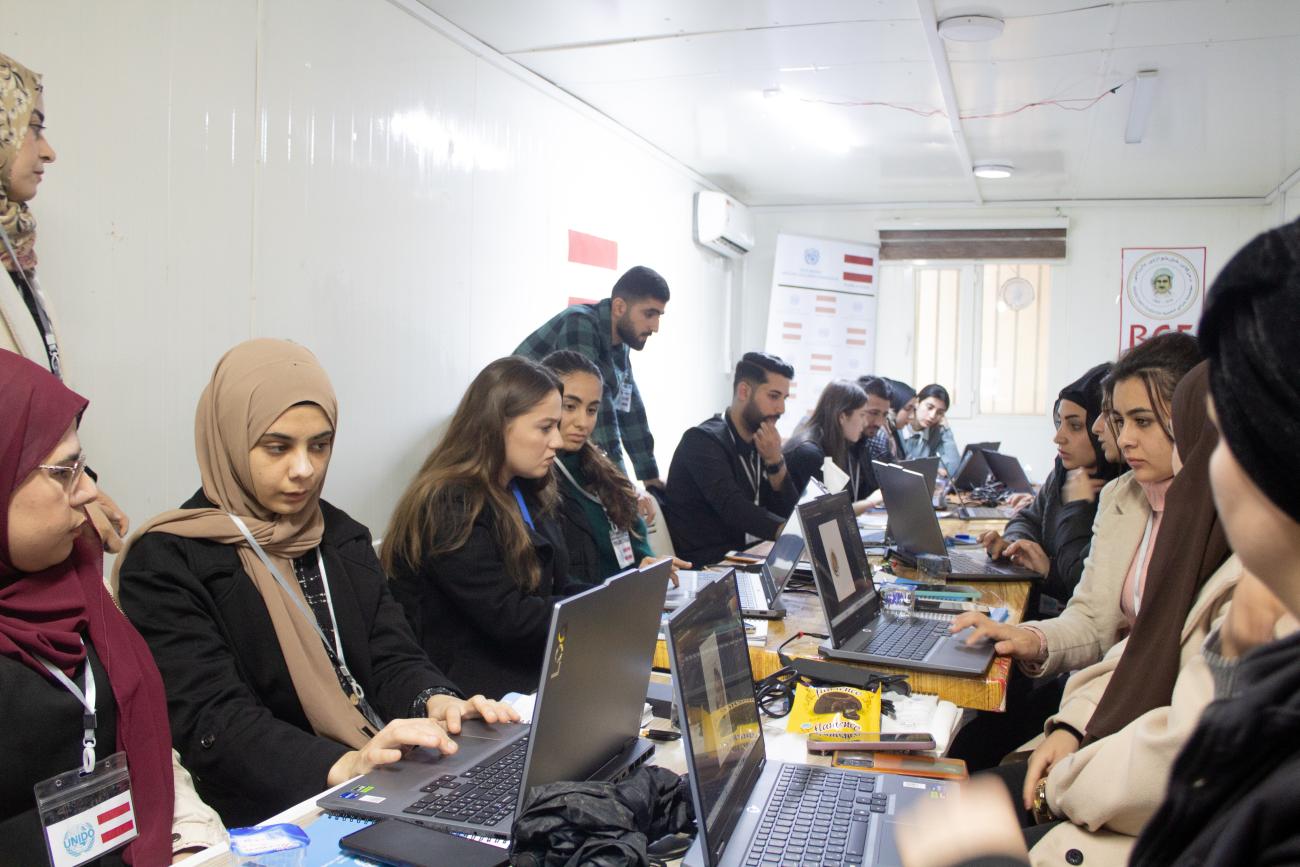Austria and UNIDO Digitally Upskill Syrian Refugees Youth at Domiz 2 Camp in Iraq

UNIDO with funding from the Austrian government, conducted a 7-day training programme at Domiz 2 Refugee Camp
The United Nations Industrial Development Organization (UNIDO), with funding from the Austrian government, conducted a 7-day training programme at Domiz 2 Refugee Camp near the city of Duhok, in the Kurdistan Region of Iraq (KRI), from 15 to 23 January 2025. This training programme is part of Austria and UNIDO's broader initiative, “Digital technology skills to enhance employability in Iraq,” to support young refugees, internally displaced persons (IDPs), returnees, and host communities with a particular focus on digital technologies and entrepreneurship. The programme aims to empower participants, especially women, by equipping them with practical skills that can lead to wage employment or self-employment.
The training attracted over 650 applications. Following a competitive selection process, 20 Syrian refugees aged 17 to 30 were chosen to participate, including 13 women. This is the first of some planned UNIDO digital technology training programmes. Participants represented both Domiz 1 and Domiz 2 refugee camps, with the majority residing in Domiz 2, where the training took place.
The training programme consisted of three key components. The first one, Photoshop and Graphic Design, spanned three days. It emphasized graphic design principles such as color theory, typography, and layout. Participants engaged in hands-on workshops, utilizing tools like Photoshop and Canva to create logos, flyers, and reusable templates. The second component, Social Media Marketing (SMM) over two days, equipped participants with skills to optimize social media accounts, plan content calendars, and execute campaigns with paid advertisements. A standout feature of the programme was the incentive for top-performing participants to receive high-end laptops, providing them with the tools to launch their careers in digital fields.
The third component, the Entrepreneurship Development Programme (EDP) over two days, introduced participants to foundational entrepreneurship concepts. The EDP guided them in identifying business opportunities and developing practical business plans using the Business Model Canvas, with a focus on budgeting and resource management.
Trainers highlighted the transformative potential of the programme. Mohammed Qasim Ali Baba, an IT specialist, emphasized the impact of the training, saying, “This type of training will greatly benefit the students. They are very smart and successful in learning graphic design techniques. I encourage them to continue practicing and focus on marketing skills to manage their own businesses in the future.”
Areen Adrees Mahmood, a computer engineer and social media expert, noted that many participants feel trapped by the challenges of the camp life. “I remind them this training is a chance to change their lives. By the second day, they already felt that they were accomplishing something important,” adding, “I hope they continue practicing even after the course is finished because graphic design skills are in high demand in the job market.” Areen also commented that she hopes to one day see that all her students succeed in managing their own businesses and improving their livelihoods and financial situations.
The trainees, on the other hand, expressed excitement and hope for their futures.
Mediya Nassar Ahmad, a 27-year-old from Domiz 2, has lived in the KRI for 10 years. She shared, “This training is so important for me. I’ve learned new skills in Photoshop and graphic design. One day, I hope to start my own business focused on technology and design. I also hope to see more women working in the tech field.” Mediya also explained that due to the challenging circumstances within camps, she had no opportunities for employment. However, the training from the Austrian government and UNIDO has given her hope for a brighter future.
Alaa Abdulhamid Sulaiman, a 23-year-old from Rojava in Syria, has lived in the KRI since 2013. He said, “As refugees, we need strong skills to compete in the job market. This training has helped me improve my graphic design skills, and I plan to promote my designs through a social media page. I encourage other refugees to join programmes like this if given the opportunity.” Alaa added that the trainers are highly experienced and have done an excellent job in not only training participantsin new digital methods but also supporting and encouraging them to use their knowledge to improve their lives.
UNIDO’s initiative aligns with its vision of fostering shared prosperity by equipping individuals with means to overcome economic challenges. As one of the trainers, Areen, aptly put it, “This is a golden opportunity for these students to change their lives. I hope they focus on the good things in their lives which will help them overcome challenges and build amazing futures.”
Beyond technical skills, this training has given participants the confidence to pursue their goals. The inclusion of women in such programmes underscores the importance of empowering marginalized groups in refugee communities.
By providing opportunities like this, UNIDO, with the funding support from the Austrian government, continues to make a significant impact in the lives of refugees, IDPs, returnees, and host community people, helping them rebuild their futures and contribute to the local economy.


